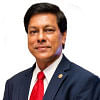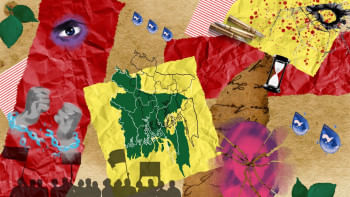A barber’s lament: The harsh reality of Bangladesh’s common people

Sitting in the familiar chair of my local barbershop, I decided to strike up a conversation with the man holding the scissors. As he worked with steady hands, I asked, "Now that we have managed to bring down the authoritarian government, how do you feel? What changes are you expecting in this new Bangladesh?"
He let out a weary sigh, his face reflecting years of silent struggle. "Sir, for ordinary people like us, nothing really changes. We remain unnoticed, unheard. People only think of us when they need us. I don't know how old you were during the Liberation War, but we fought for a Bangladesh free from discrimination and oppression—just as we did in the July-August movement. Yet, since independence, governments have come and gone, but our lives remain the same."
He paused for a moment, then continued, his voice tinged with resignation. "We keep hearing about economic growth and development. The city expands before our eyes—new flyovers, high-rise buildings, shopping malls—but none of it benefits us. We are not part of this progress. We still struggle for the basics: housing, education, healthcare, even daily essentials."
His words carried the weight of a lifetime of disappointment. "Sir, since you asked, let me be frank with you. Common people don't ask for much. Our demands are simple: we want a fair and safe environment to live and work in, free from the fear of bribery and extortion. We hope for fair prices for essentials, uninterrupted electricity, clean water, and a reliable gas supply. We don't seek luxury, just a life of dignity. But tell me, in the past 54 years, has any ruling party truly cared about us? They have ruled us, but they never wanted us to prosper. Their own prosperity was their only concern."
He set down his scissors momentarily, his eyes meeting mine in the mirror. "The ruling class—no matter which party is in power—has captured the state. They use bureaucrats, the judiciary, and the police to tighten their grip. And so, nothing changes for people like us."
Then, after a brief silence, he asked me, "Sir, have you ever seen where we live?"
"No, I haven't," I admitted.
He nodded knowingly. "It's not just me—most people like us live in small, one-room tin-shed houses in slums. Overcrowded, with no clean water, no proper sanitation. In the summer, our homes are unbearably hot; during the monsoon, our streets flood because of poor drainage. Every year, the authorities promise that things will improve, but that never comes. We are left wading through knee-deep water, watching our homes get inundated, year after year."
Picking up his comb, his voice now edged with frustration, he continued, "Sir, tell me, they spend so much on roads, flyovers, and luxury buildings—can't they build low-cost housing for us? Small, 200-300 sq-ft affordable flats in the same slum areas? We are not asking for charity. We will buy them in monthly instalments. Wouldn't that be real development?"
I nodded, realising how little policymakers consider the everyday struggles of people like him.
"Many politicians claim their politics serves the people and upholds democracy. Do you believe them?" I asked.
He gave a bitter smile. "Sir, all political parties sell democracy before elections. But isn't it funny that most of them lack democracy within their own parties? If they don't practise democratic values internally, how can they establish democracy in the country? It's all a one-man show. Real democracy means ordinary people have a say, leaders are accountable, and policies benefit everyone—not just a handful of elites. Tell me, sir, in all these years, have we ever had a leader who truly worked for the common people? They promise, they lie, they win elections, and then they forget us."
He continued, "If they cared about us, they would invest in education and healthcare. Our children don't receive quality education. There's a vast gap between city schools and rural schools. Since their children study in expensive English medium schools or abroad; they have no interest in improving public education. Tell me, sir, if our children don't get a decent education, how can they compete in the job market?
"Public hospitals are the same. The prime minister, ministers, MPs, and the rich never use them. Even for a routine check-up, they go abroad. They don't trust their own healthcare system, so how can we expect public hospitals to improve? The entire system is broken. It serves the elite, not us."
I asked, "Corruption has been a long-standing issue in Bangladesh. What's your take on it?"
"Sir, a fish rots from the head down. If leaders are corrupt, corruption spreads at all levels. Common people don't loot banks or syphon money abroad; it is the politicians, corrupt businessmen, police, and government officials who do so. Unless change starts at the top, nothing will improve. Look at countries like Singapore, Malaysia and even Vietnam. They took strict action against corruption, and their leaders prioritised national progress over personal gain. But in Bangladesh, no high-profile politicians, businessmen or government officials have ever faced real punishment for corruption—only a few petty ones."
I then asked, "Nobel Laureate Muhammad Yunus is now in charge of the country. Do you think he can bring real change?"
"Sir, that's a tough question. Dr Yunus is our pride, recognised globally. He definitely has vision, an international network, and leadership qualities, but he alone cannot change anything unless he receives full support from all of us—including political parties, the administration, the police, and the judiciary. Didn't you notice that since he took charge, barely a day has passed without protests? He has been under tremendous pressure from day one. Of course, some protests are genuine, but many are orchestrated to destabilise the interim government. And let's not forget that there are still many in the administration loyal to the previous regime who don't want this government to succeed."
I asked, "What's your take on the election?"
He sighed. "Sir, an elected government must run the country, so an election is necessary. But not before fixing the mess that has destroyed our institutions. Even after 54 years of independence, we remain divided, unable to work collectively. If we don't fix this, our expectations will remain unfulfilled."
He sighed again, placing the final touches on my haircut. "Sir, we are simple people. We don't dream of riches, just a dignified life. But in this country, dignity is a privilege of the few. When will that change?"
As I stepped out of the barbershop, his words weighed heavily on my mind. His lament was not just personal grief—it was the unspoken agony of millions who toil in silence, their hopes battered by decades of political deception. Bangladesh has seen leaders come and go, each promising change, yet leaving the common people trapped in the same cycle of hardship. Real change will not come from slogans or grand speeches. It must be built on justice, accountability, and a system that prioritises people over power. The barber's question lingered in my mind, "When will dignity cease to be a privilege of the few?" That, perhaps, is the question all Bangladeshis must ask—and demand an answer to.
Abu Afsarul Haider is an entrepreneur. He can be reached at [email protected].
Views expressed in this article are the author's own.
Follow The Daily Star Opinion on Facebook for the latest opinions, commentaries and analyses by experts and professionals. To contribute your article or letter to The Daily Star Opinion, see our guidelines for submission.

 For all latest news, follow The Daily Star's Google News channel.
For all latest news, follow The Daily Star's Google News channel. 






Comments